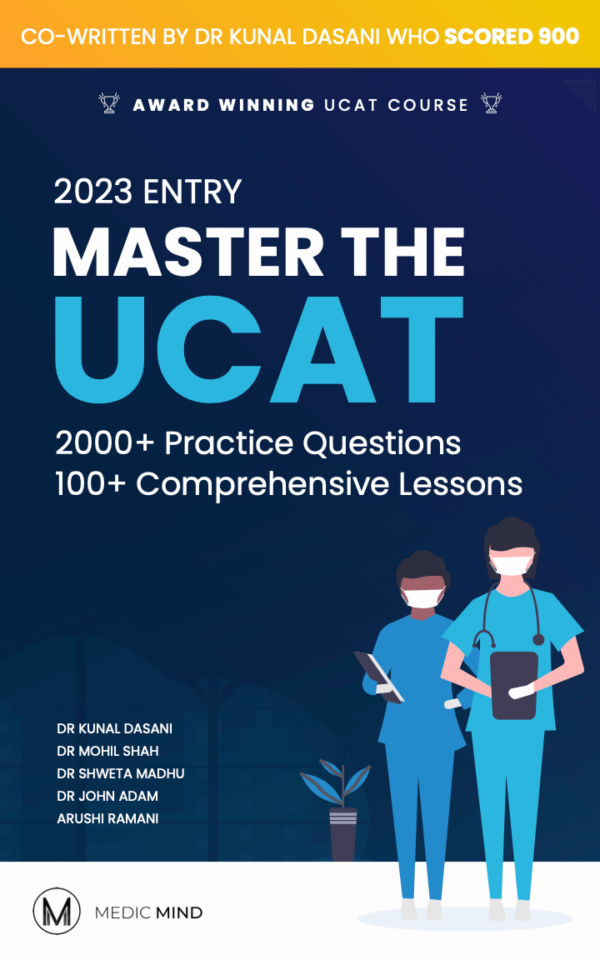Loading...

UCAT Top Tips: Your Guide to Mastering the Exam
If you’re planning to complete a medical application to medical or dental school in the UK, the University Clinical Aptitude Test (UCAT) is likely a part of your application process. The UCAT is an admissions test designed to assess your cognitive abilities, including your critical thinking, problem-solving, and decision-making skills. Here are some top tips to help you prepare for and ace the UCAT 2023.

Understanding the Structure and Format of UCAT
The UCAT 2023 is a computer-based test that lasts for two hours. The exam consists of five sections, each assessing a different cognitive skill. The five sections are:
- Verbal Reasoning: This section assesses your ability to critically evaluate information presented in a written format.
- Quantitative Reasoning: This section assesses your numerical skills and ability to solve problems using data.
- Abstract Reasoning: This section assesses your ability to identify patterns, relationships, and connections.
- Decision Making: This section assesses your ability to make sound decisions based on the information presented.
- Situational Judgment: This section assesses your ability to evaluate different scenarios and choose the most appropriate action.
Each subtest features a different number of questions, and each question carries a value of one mark, with the exception of the Decision Making subtest. In this section, some questions may be worth two marks if multiple statements are correct, and partially correct answers are rewarded with a single mark.
Your overall UCAT score is determined by adding up your results in Verbal Reasoning, Decision Making, Quantitative Reasoning, and Abstract Reasoning. Each of these cognitive subtests uses a scale score range of 300-900. The total scale score range for the entire test is 1,200-3,600.
The Situational Judgement test is made up of 69 questions and is scored separately from the other subtests. Your performance will be ranked within one of four bands, with Band 1 representing the highest ranking and Band 4 the lowest, in the Situational Judgement test. This section of the exam may be weighted differently in the selection process.
UCAT 2023 Preparation and Revision Tips
When it comes to preparing for the UCAT, there are many tips and strategies you can use to optimise your performance. One of the most important things to keep in mind is that the UCAT is not just a test of your knowledge or intelligence but rather a test of your cognitive abilities. This means that while subject-specific knowledge is certainly helpful, what really matters is your ability to think critically, solve problems, and make decisions under pressure.
Here are some tips to help you prepare for the UCAT exam & boost your UCAT score rankings:
1- Start Early and Set Realistic Goals:
The earlier you start UCAT preparation, the more time you’ll have to practice and improve your skills. Most students start their preparation at the beginning of Year 12, but if you’re a latecomer, don’t panic.
Just set a realistic goal and plan your preparation accordingly. You don’t want to overload yourself with too much study material, but you also don’t want to leave everything until the last minute.
2- Create a study plan:
Start your preparation by creating a study plan that includes a timetable and specific goals for each day.
3- Use practice materials:
There are many UCAT practice materials available online, including practice tests, UCAT question banks and UCAT textbooks. Use these resources to familiarise yourself with the test format and hone your skills.
4- Effective revision:
Spending 25-30 hours preparing for the exam is the sweet spot, according to the UCAT experts. But remember that practising for too long can lead to diminishing returns, so ensure your revision is focused and effective.

5- Manage your time:
Aim to revise for around an hour consistently each day. As the test date approaches, you may want to designate more time for preparation.
6- Take breaks:
Taking breaks is essential for effective studying. Take short breaks every hour or so to refresh your mind.
UCAT 2023 Exam Practise Tips
1- Take practice tests:
Taking practise tests is an excellent way to prepare for the UCAT 2023. Use these tests to simulate the actual exam conditions and identify your strengths and weaknesses.
2- Review your answers:
After each practise test, review your answers to identify any mistakes you made and learn from them.
3- Use your resources wisely:
When selecting resources, consider the variety of questions they offer and if they contain reliable worked solutions. There are also websites and YouTube videos that provide tips and advice on how to tackle the exam’s subsections.
4- Mimic the test conditions:
When you practise UCAT questions, try to mimic the exam conditions as closely as possible. Sit your mock tests on a desktop computer and try to adapt to the pressurised environment of the exam. Use keyboard shortcuts and the calculator only when necessary. This will help you develop time-saving strategies that will come in handy during the actual exam.
5- Turn weaknesses into strengths:
Identifying your weaknesses is the first step in improving your UCAT score rankings. After each study session, reflect on your performance and identify the types of questions you struggled with. Try to understand the explanations and make a note of the amount of time you spent on each question. Experiment with different preparation strategies and find what works best for you.
Tailored Tips for Each Subsection of UCAT 2023
A- Verbal Reasoning:
- Start with questions before reading the passage to locate relevant sections quickly.
- Familiarise yourself with different types of comprehension questions such as “True or False” and “Most Suitable.”
- Be cautious when answering “Most Appropriate” questions and consider all answer options.
- Watch out for negative wording and stay attentive to the phrasing.
- Focus solely on the information presented in the passage and avoid utilising outside knowledge.
- Avoid common traps such as Dispersion, Contradiction, Mitigating, and Definitive Words.
B- Quantitative Reasoning:
Brush up on your basic math skills, including fractions, decimals, percentages, and ratios.
- Don’t rely on a calculator for everything; perfect your basic arithmetic skills.
- Learn calculator and whiteboard shortcuts, including Alt+p for the previous question, Alt+n for the next question, and Ctrl+C to make the calculator appear.
- Rule out obvious outliers in answer options to find correct answers faster.
- Understand different units used in the questions and be aware of conversions between similar units.
C- Abstract Reasoning:
Practice identifying patterns and relationships. Learn the four common patterns: Shape, Number, Arrangement, and Colour. Look for similarities and differences between different shapes and symbols. Create a mnemonic or set of questions to help identify patterns, such as SCANS for Shapes, Colour, Arrangement, Number and Size.
D- Decision Making:
Use a structured approach to evaluate the information presented in the scenario. Consider the pros and cons of each option before making a decision.
- Digest all information and data given to you to draw a valid conclusion.
- Avoid assumptions and read the question carefully to find missing information.
- Use the digital calculator and whiteboard to keep track of elements and save time.
- Make an educated guess and flag questions if unsure to come back to later.
- Revise graphs and charts to interpret and find answers from provided data.
- Identify strongest argument for or against a statement by revising fast argument and reasoning skills.
E- Situational Judgment:
Look for clues in the scenario to identify the key issues and consider the consequences of each option before choosing the most appropriate action.
Some Tips for UCAT Time Management
- Prioritise your time: Allocate more time to sections where you feel less confident.
- Don’t get stuck: If you’re stuck on a question, move on to the next one and come back to it later.
- Practise under timed conditions: Practicing under timed conditions will help you get used to the pressure of the actual exam.
Other tips to prepare for UCAT 2023 exam day
- Get enough sleep: Getting enough sleep is essential for effective studying and performing well on the UCAT.
- Stay hydrated: Drink plenty of water to stay hydrated and alert during the exam.
- Dress comfortably: Wear comfortable clothes on exam day minimises distractions and help you stay focused.
FAQS
→ What is a good UCAT score?
Typically, a good UCAT score is defined as anything above 680. Scoring above this threshold will enable you to submit a competitive application to almost all medical schools. However, it’s important to note that each medical school has its unique admission requirements, and the majority of successful applicants score lower than this benchmark.
→ How hard is the UCAT?
The difficulty level of the UCAT varies from person to person, but overall it is considered to be a challenging exam. The UCAT is designed to test your critical thinking, problem-solving, and decision-making skills under time pressure. However, with the right preparation and practice, it is possible to achieve a good score. There are numerous resources available, including practice tests, study guides, and tutoring services, to help you prepare for the exam.
→ Can I sit the test more than once?
Candidates may only test once in any test cycle. Instances of multiple testing in the same year will be treated as misconduct and all results will be withdrawn. There is no penalty for taking the test again in subsequent years.
Support for the whole medical application process from UCAS application, UCAT/BMAT, personal statement, interview and more!
With over 1000 UCAT questions, mock paper walkthroughs and timing tips and advice
A unique opportunity to explore the world of healthcare through interactive simulations and real-life case studies. Run by senior physicians
Personalised private lessons, tailored to your UCAT needs





Was this article helpful?
Still got a question? Leave a comment
Leave a comment